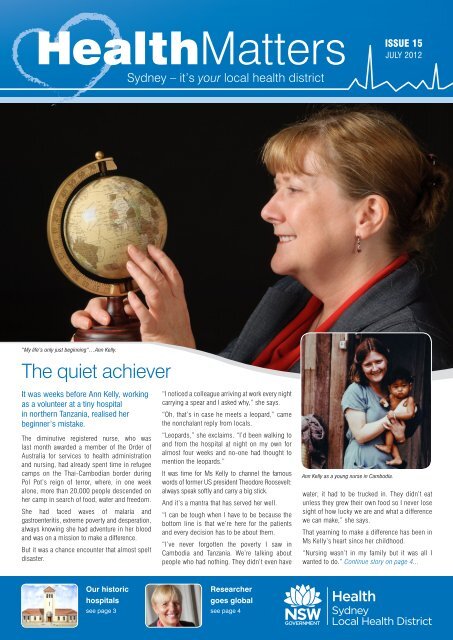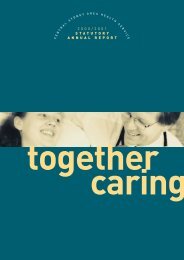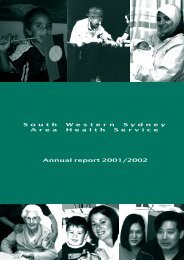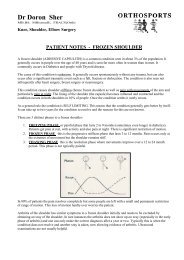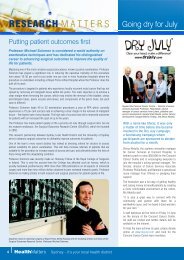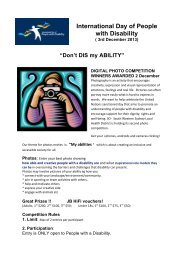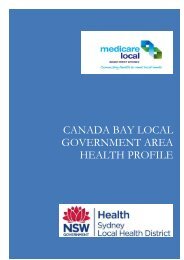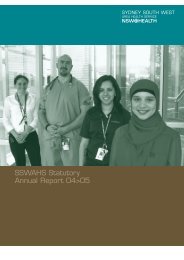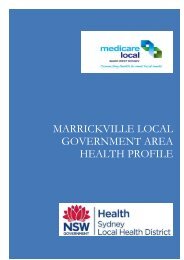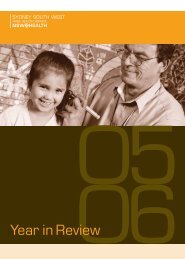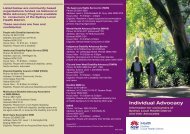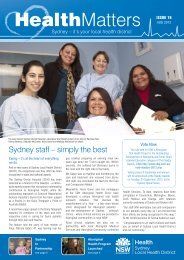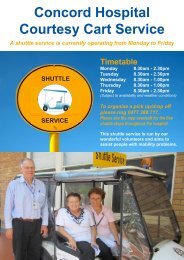July 2012 - Sydney Local Health District
July 2012 - Sydney Local Health District
July 2012 - Sydney Local Health District
Create successful ePaper yourself
Turn your PDF publications into a flip-book with our unique Google optimized e-Paper software.
<strong>Health</strong>Matters<br />
<strong>Sydney</strong> – it’s your local health district<br />
Issue 15<br />
<strong>July</strong> <strong>2012</strong><br />
“My life’s only just beginning”…Ann Kelly.<br />
The quiet achiever<br />
It was weeks before Ann Kelly, working<br />
as a volunteer at a tiny hospital<br />
in northern Tanzania, realised her<br />
beginner’s mistake.<br />
The diminutive registered nurse, who was<br />
last month awarded a member of the Order of<br />
Australia for services to health administration<br />
and nursing, had already spent time in refugee<br />
camps on the Thai-Cambodian border during<br />
Pol Pot’s reign of terror, where, in one week<br />
alone, more than 20,000 people descended on<br />
her camp in search of food, water and freedom.<br />
She had faced waves of malaria and<br />
gastroenteritis, extreme poverty and desperation,<br />
always knowing she had adventure in her blood<br />
and was on a mission to make a difference.<br />
But it was a chance encounter that almost spelt<br />
disaster.<br />
“I noticed a colleague arriving at work every night<br />
carrying a spear and I asked why,” she says.<br />
“Oh, that’s in case he meets a leopard,” came<br />
the nonchalant reply from locals.<br />
“Leopards,” she exclaims. “I’d been walking to<br />
and from the hospital at night on my own for<br />
almost four weeks and no-one had thought to<br />
mention the leopards.”<br />
It was time for Ms Kelly to channel the famous<br />
words of former US president Theodore Roosevelt:<br />
always speak softly and carry a big stick.<br />
And it’s a mantra that has served her well.<br />
“I can be tough when I have to be because the<br />
bottom line is that we’re here for the patients<br />
and every decision has to be about them.<br />
“I’ve never forgotten the poverty I saw in<br />
Cambodia and Tanzania. We’re talking about<br />
people who had nothing. They didn’t even have<br />
Ann Kelly as a young nurse in Cambodia.<br />
water; it had to be trucked in. They didn’t eat<br />
unless they grew their own food so I never lose<br />
sight of how lucky we are and what a difference<br />
we can make,” she says.<br />
That yearning to make a difference has been in<br />
Ms Kelly’s heart since her childhood.<br />
“Nursing wasn’t in my family but it was all I<br />
wanted to do.” Continue story on page 4...<br />
Our historic<br />
hospitals<br />
see page 3<br />
Researcher<br />
goes global<br />
see page 4
Message from the Chief Executive<br />
Dr Teresa Anderson<br />
<strong>Sydney</strong> <strong>Local</strong> <strong>Health</strong> <strong>District</strong><br />
Chief Executive<br />
On 1 <strong>July</strong>, <strong>Sydney</strong> <strong>Local</strong> <strong>Health</strong> <strong>District</strong> celebrated its first<br />
birthday!<br />
It has been quite a year of new challenges and hard work.<br />
Thank you to all our staff who have made our <strong>District</strong>,<br />
its hospitals, all the clinical networks and our extensive<br />
services work so well for our patients. Especially while we<br />
are making really significant changes to our business at a<br />
local level as part of health reform in NSW.<br />
These reforms give us greater local responsibility for<br />
services, better networking and partnerships, improved<br />
transparency and oversight through the establishment of<br />
Boards. In the last 12 months, this <strong>Local</strong> <strong>Health</strong> <strong>District</strong><br />
has worked tirelessly to achieve excellence in healthcare<br />
for all.<br />
The next step is Funding Reform. For the first time in<br />
NSW our <strong>Local</strong> <strong>Health</strong> <strong>District</strong> will be allocated funding<br />
using a combination of patient activity and block funding<br />
grants. Patient activity refers to funds paid to the LHD<br />
on the basis of the number of patients treated including<br />
Acute inpatients, Emergency Departments, Outpatients<br />
and Mental <strong>Health</strong> and Sub Acute patients. Block funding<br />
will resource us for things like teaching and research,<br />
community and population health.<br />
This new approach will help the LHD spend our<br />
healthcare dollars more openly, allowing the community<br />
to understand how their healthcare dollars are being<br />
spent, enabling district’s like ours to plan services more<br />
efficiently.<br />
Activity Based Funding does not mean there will be<br />
additional Federal health funding. Federal money<br />
allocated to healthcare in NSW will remain the same until<br />
mid 2014. The State budget continues to fund over 70 per<br />
cent of our budget.<br />
Funding Reform focuses on improving the way we manage<br />
the cost of providing care to our patients. It means we all<br />
need to work together to provide the most effective and<br />
innovative services possible. <strong>Sydney</strong> <strong>Local</strong> <strong>Health</strong> <strong>District</strong><br />
has a proud history of innovation in healthcare delivery.<br />
The new funding arrangement will help provide us with<br />
further opportunities for developing strategies to improve<br />
the care we provide to patients.<br />
The funding reform does mean <strong>Sydney</strong> <strong>Local</strong> <strong>Health</strong><br />
<strong>District</strong> staff will have to work together to implement the<br />
changes. We will continue drawing advice from a number<br />
of experts within our Hospitals and our consultants.<br />
Going forward, we will be hosting a series of information<br />
sessions within the <strong>District</strong> to help explain the new funding<br />
model to all staff and our community. Notification of these<br />
sessions will be placed on our website and intranet.<br />
Message from the Chair, <strong>District</strong> Board<br />
The Hon. Ron Phillips<br />
<strong>Sydney</strong> <strong>Local</strong> <strong>Health</strong> <strong>District</strong><br />
Board Chairman<br />
Every single day in <strong>Sydney</strong> <strong>Local</strong> <strong>Health</strong> <strong>District</strong>, staff<br />
come together across all of our services to touch the lives<br />
of so many people in the community. These patients are<br />
at the centre of every decision made and will continue to<br />
be our number one priority over the coming year.<br />
<strong>July</strong> marks the beginning of the <strong>Sydney</strong> <strong>Local</strong> <strong>Health</strong><br />
<strong>District</strong>’s second financial year in operation. As well as<br />
strengthening our Governance arrangements and putting<br />
plans in place to continue to nurture and grow our well<br />
established reputation for excellence, this <strong>District</strong> has<br />
witnessed the implementation of significant strategic<br />
goals. We finalised and launched our Strategic Plan in<br />
April, outlining the <strong>District</strong>’s vision to achieve excellence<br />
in healthcare for all. The plan reiterates our CORE values<br />
– Collaboration, Openness, Respect, Empowerment. We<br />
have launched a new website that aims to be inclusive<br />
and interactive to help inform the community about the<br />
<strong>District</strong> and its services. This website will continue to<br />
grow and evolve – I encourage you all to visit the site to<br />
see the latest news, videos and publications at www.slhd.<br />
nsw.gov.au. We have also set up new mechanisms for<br />
community feedback and for our staff to be recognised<br />
for their daily contribution.<br />
In the next financial year the Board will oversee the<br />
<strong>District</strong>’s implementation of the new funding reform<br />
model, the launch of the Research Plan in August as well<br />
as the Education and Training Plan, Sustainability Plan<br />
and Community Participation Framework later in <strong>2012</strong>.<br />
We will begin planning for clinical services and continue<br />
to focus on how we can improve the way we deliver care<br />
to our community.<br />
From 1 <strong>July</strong> <strong>2012</strong>, SLHD has been allocated funding<br />
under the new funding model using a combination<br />
of funding based on patient activity (Activity Based<br />
Funding), and block funding grants. For the first time this<br />
means how we fund our health services will be far more<br />
transparent. Clinicians, Boards, staff and communities<br />
will have greater understanding of how our hospitals<br />
are funded, where the money is spent and be able to<br />
participate in, and contribute to, decisions about the right<br />
resourcing of our system.<br />
The Budget presents the <strong>District</strong> with new challenges,<br />
but we are confident that the expertise of our staff and<br />
our relationships with partner organisations will see the<br />
organisation remain on track. The Budget will be made<br />
available on our website in the coming weeks.<br />
I’d like to congratulate staff on their achievements<br />
and look forward to working with you as we face the<br />
challenges the new financial year will bring.<br />
2 <strong>Health</strong>Matters <strong>Sydney</strong> – it’s your local health district
The art of healing<br />
Artist Simon Fieldhouse, (left), NSW Governor Marie Bashir and SLHD Director, Operations, Gary Miller.<br />
The architectural grandeur and social<br />
significance of some of SLHD’s<br />
historical buildings were featured last<br />
month at the opening of an exhibition<br />
of paintings by acclaimed painter<br />
Simon Woodhouse.<br />
NSW Governor, the Hon Marie Bashir, was<br />
special guest at the RPA event, where the series<br />
of pencil and ink paintings were unveiled. The<br />
series include paintings of RPA, Balmain,<br />
Canterbury and Concord Hospitals, the King<br />
George V building, the Dame Eadith Walker<br />
Hospital, the <strong>Sydney</strong> Dental Hospital, the<br />
historic gates of Thomas Walker Hospital<br />
(Rivendell) and the historic gates of Callan Park<br />
(the former Rozelle Hospital).<br />
SLHD Director, Operations, Gary Miller, said the<br />
paintings were a way of celebrating the social<br />
and architectural significance of the <strong>District</strong>’s<br />
facilities and its long history of excellence in<br />
healthcare delivery.<br />
“Not only are some of them outstanding examples<br />
of period architecture and design and considered<br />
to be of the highest heritage value, they have<br />
continuously served the health care needs of their<br />
communities for several decades, in some cases<br />
for more than 130 years,” Mr Miller said.<br />
“All will proudly continue to do so for many<br />
years to come.”<br />
Simon Fieldhouse is a prodigious Australian<br />
architectural artist based in <strong>Sydney</strong>, who has<br />
sketched virtually every historic Australian<br />
building of merit, as well as several great<br />
buildings in London, Paris, New York, India.<br />
To view photographs and a video of the opening,<br />
and to view the paintings with accompanying<br />
texts, go to http://www.slhd.nsw.gov.au/media_<br />
photo.html<br />
People Matter – NSW Public Sector<br />
employee survey<br />
In <strong>July</strong> <strong>2012</strong>, the Public Service Commission will<br />
conduct a sector-wide employee survey in NSW.<br />
For the first time, all employees within the NSW<br />
public sector will have an opportunity to “have<br />
their say” on their perceptions on values and the<br />
workplace culture in their organisation.<br />
Information will be posted on the SLHD intranet.<br />
New uniform supplier announced<br />
NSW <strong>Health</strong> is introducing a new range of<br />
comfortable and functional uniforms for staff that<br />
will be standardised across the state.<br />
Following a comprehensive tender process, Parsons<br />
Logistiks has been selected as the provider.<br />
It is anticipated that frontline clinical staff will wear<br />
a ‘scrubs style’ uniform and, to assist in the final<br />
design of the style, HSS has recruited volunteers<br />
through the Uniform Implementation Project<br />
Steering Committee (PSC) and NSW Nurses<br />
Association to participate in a uniform wearer trial.<br />
Each volunteer will be allocated three different<br />
uniform styles in three different fabrics for 30<br />
days. Trial participants will wear the uniforms<br />
while undertaking their everyday duties, and at the<br />
completion of the trial will complete an online survey.<br />
Survey results will be provided to the Uniform<br />
Working Party, which will document recommended<br />
changes to the styles and fabric and submit to<br />
the PSC for approval. This process should be<br />
completed by September.<br />
Staff should continue to order their current<br />
uniforms and can be confident there are adequate<br />
supplies available.<br />
For information about uniform ordering, sale items<br />
and stock availability, contact Bisley Corporate<br />
Customer Service on 1300 656 440.<br />
Click on the below link to take you to the NSW<br />
<strong>Health</strong> Uniform order forms: http://intranet.hss.<br />
health.nsw.gov.au/hss_uniforms<br />
<strong>Health</strong>Matters<br />
3
Research M a t t e r s<br />
The quiet achiever<br />
- continued from page 1<br />
Clearing the fog on chemo brain<br />
A medical oncologist from the <strong>Sydney</strong> Cancer Centre has<br />
taken out one of the world’s most prestigious awards in cancer<br />
research at last month’s prestigious American Society for<br />
Clinical Oncology meeting, held in Chicago.<br />
Associate Professor Janette Vardy, also the only Australian to be honoured at the meeting,<br />
was awarded the <strong>2012</strong> Advanced Clinical Research Award in Breast Cancer, which includes a<br />
three-year $450,000 grant to research cognitive impairment in breast cancer survivors, a field<br />
which has attracted little funding to date.<br />
The award has never before been granted to recipients outside the United States.<br />
Up to 70 per cent of cancer survivors report changes to their memory and concentration during<br />
and after chemotherapy, with many feeling that this impacts significantly on their quality of life<br />
and ability to function.<br />
The cause of these side effects is unknown and there is no proven treatment.<br />
“We know that after a cancer diagnosis and cancer treatment a significant number of people<br />
notice problems with memory, concentration and multi-tasking. What we don’t know is how<br />
best to treat it,” Dr Vardy said.<br />
“For some the cognitive impairment is subtle. They just don’t feel as clear headed as they<br />
once did. But for others it is significant and makes their return to work difficult.”<br />
The study, which will also be conducted by Dr Haryana Dhillon from the University of <strong>Sydney</strong>,<br />
will evaluate two cognitive rehabilitation programs to determine whether they can decrease<br />
cognitive impairment in women who have undergone chemotherapy.<br />
Dr Vardy hopes to raise about $1 million through fundraising at Concord Hospital to set up<br />
a survivorship centre, to treat and research longer term effects of cancer and its treatment in<br />
survivors. A survivorship research gym is already in place at the hospital.<br />
“With the ageing population a lot more people are being diagnosed with cancer, and with<br />
improvements in detection and treatments we have many more people surviving and living<br />
longer,” Dr Vardy said.<br />
“They often have lingering issues with fatigue, sleep, sexuality, body image or fears of a<br />
recurrence of their illness and the centre can offer a holistic approach to help them cope with<br />
life beyond acute treatment.”<br />
She started at RPA as a student nurse in 1972,<br />
working her way up to NUM of emergency, then<br />
director of nursing at Balmain, general manager at<br />
Balmain and now general manager at Canterbury.<br />
In her spare time she dabbles in cross stitch,<br />
knitting and opera, and has almost completed a<br />
doctorate in business administration with a thesis<br />
on chronic disease management.<br />
“My life’s only just beginning,” she says. “But to<br />
anyone wanting to take this path I’d say work hard,<br />
enjoy yourself and put the patient first. Oh, and<br />
always carry a spear.”<br />
Other winners include Professor John Rasko,<br />
head of the Department of Cell and Molecular<br />
Therapies at RPA and the Gene and Stem Cell<br />
Therapy Program at the Centenary Institute, who<br />
was awarded an Order of Australia medal for<br />
distinguished service to biomedical research in<br />
the field of gene and cell therapy, as a clinician,<br />
author and administrator, through executive<br />
roles with professional organisations, and to<br />
philanthropy.<br />
And RPA neurologist Michael Halmaygi, who<br />
was also given an Order of Australia medal, for<br />
his work as a clinician and educator, and through<br />
contributions to research into the diagnosis and<br />
treatment of disorders of the nervous system.<br />
<strong>Sydney</strong> <strong>Local</strong> <strong>Health</strong> <strong>District</strong>, RPA<br />
and Lifehouse are continuing to work<br />
together ahead of the transition of some<br />
cancer services in 2013.<br />
The <strong>District</strong> has established an intranet<br />
link for staff with updated information<br />
about the ongoing work to ensure the<br />
smooth transition.<br />
The intranet page can be accessed by<br />
clicking http://intranet.sswahs.nsw.gov.<br />
au/SLHD/LifeHouse/default.htm<br />
Dr Janette Vardy with Erika Jungfer at Concord Hospital.<br />
4 <strong>Health</strong>Matters <strong>Sydney</strong> – it’s your local health district
Respect, Family, Power and<br />
Pacific Culture<br />
Youthblock Youth <strong>Health</strong> Service Manager Michelle Lampis with youthworker Taniela T. Afu<br />
Keeping at-risk Pacific Islander young<br />
people out of the juvenile justice<br />
system by engaging them in an<br />
exploration of their culture and identity<br />
is the aim of a pilot counselling<br />
program launched by <strong>Sydney</strong> <strong>Local</strong><br />
<strong>Health</strong> <strong>District</strong>’s Youthblock Youth<br />
<strong>Health</strong> Service.<br />
Youthblock Manager, Michelle Lampis, said<br />
research indicated that the loss of culture was a<br />
factor in the over representation of Pacific Islander<br />
young people in the juvenile justice system.<br />
“Young people with a healthy self-esteem and<br />
sense of identity are more likely to make positive<br />
choices,” Ms Lampis said.<br />
“The Pacific Youth Identity Project will also aim to<br />
reduce the rates of drug and alcohol misuse and<br />
sexually transmitted infections, by encouraging<br />
and fostering healthy behaviour and relationships<br />
in a small group setting.<br />
“Islander populations place a high value on the<br />
roles of family, clan, religion, community and a<br />
heavy emphasis on respect for elders and others,<br />
so it is important we encourage young people to<br />
identify with their heritage,” she said.<br />
The program was launched during an open day<br />
at Marrickville Youth Resource Centre with the<br />
help of traditional foods, music and art, and the<br />
screening of a short documentary.<br />
The film follows several people from the Pacific<br />
Islander community and explores their stories of<br />
migration, culture and life in Australia.<br />
The Respect, Family, Power and Pacific Culture<br />
DVD will be used in small group sessions to<br />
promote discussion about culture and heritage<br />
and examine how they strengthen and enrich<br />
young peoples’ lives.<br />
Sharing a healthy diet<br />
SLHD and the Central <strong>Sydney</strong> GP Network have<br />
collaborated to develop an innovative pilot<br />
program that encourages people living with<br />
mental illness to plan, cook and share meals<br />
together so they can enhance their confidence<br />
and living skills.<br />
SLHD Mental <strong>Health</strong> Promotion Officer, Brooke<br />
Dailey, said the Community Kitchen program,<br />
based at Croydon Cottage in the grounds of<br />
Croydon Community <strong>Health</strong> Centre, would teach<br />
participants how to take control of their food and<br />
menu choices.<br />
“We encourage people to engage together<br />
in planning menus, making shopping lists,<br />
budgeting, preparing food then sharing the<br />
meal,” Ms Dailey said.<br />
“Participants are also given dry stores packs and<br />
recipe cards so they can do the same thing at home.<br />
“We hope the activities will increase their<br />
knowledge about nutrition, food hygiene, food<br />
preparation, healthy eating and cooking – all of<br />
which can be extremely satisfying and contribute<br />
to greater self-esteem,” she said.<br />
Brooke Dailey(foreground), Lisa Maude and Akosua<br />
Amoako prepare a meal for the Community Kitchen at<br />
Croydon Cottage.<br />
<strong>Health</strong>Matters<br />
5
Kids make their mark<br />
Madison (left), Brody and Breeinie helped to create the COPMI mural mounted at Concord Centre for Mental <strong>Health</strong>.<br />
A colourful and permanent reminder of<br />
the value of family has been mounted<br />
at the Concord Centre for Mental <strong>Health</strong><br />
– the handiwork of a group of around<br />
20 children whose parents live with a<br />
mental illness.<br />
Breeinie Barlow, 16, her sister Madison, 9, and<br />
brother Brody, 8, helped to design and create<br />
the ceramic mural – their mother Leanne was<br />
diagnosed with bipolar in 2007.<br />
“It was a really good and fun thing to do and it<br />
is great to see it up on the wall”, Breeinie said.<br />
Mental <strong>Health</strong> Family Team Clinical Nurse<br />
Consultant, Sophie Norrish, said the project<br />
aimed to give the children some positive<br />
recognition and a sense of pride.<br />
“The mural was also supposed to raise<br />
awareness of the presence of children in Mental<br />
<strong>Health</strong> services,” Ms Norrish said.<br />
“It would also be a daily reminder for clients and<br />
staff of the importance of family,” she said.<br />
The COPMI (Children of Parents with a Mental<br />
Illness) project was completed in collaboration<br />
with artists from ‘Ceramics in Schools’. The<br />
design incorporates elements from the local area,<br />
including Concord Repatriation General Hospital.<br />
Nursing a passion for high tech healing<br />
Clinical Emergency Response System acting CNC Jamie<br />
Mann-Farrar has been offered the Judith Meppem<br />
Scholarship.<br />
Highly specialised computer games<br />
could become training aids of<br />
the future for frontline health care<br />
workers following research by Clinical<br />
Emergency Response System acting<br />
CNC Jamie Mann-Farrar.<br />
Mr Mann-Farrer is one of two SLHD nursing staff<br />
to be offered the Judith Meppem Scholarship,<br />
and will use the funds to further investigate the<br />
use of virtual reality technology to ensure all<br />
clinical staff gain access to ongoing education.<br />
“Using a computer tablet or smart phone means<br />
shift workers can access training programs at<br />
any time”, Mr Mann-Farrer said.<br />
“The avatar software programs can be used in<br />
much the same way as a training mannequin, but<br />
without the need for the user to be sitting in a<br />
training lab.”<br />
The Judith Meppem Scholarships are awarded<br />
annually to give NSW nurses and midwives the<br />
chance to undertake an overseas study tour to<br />
identify potential improvements in practice and<br />
care delivery.<br />
Concord Centre for Mental <strong>Health</strong> Clinical<br />
Nurse Consultant, Paul De Carlo, will also travel<br />
overseas to review progress in the reduction of<br />
seclusion and restraint in Mental <strong>Health</strong> Units.<br />
“There is already work underway to eliminate<br />
where possible the use of seclusion and restraint<br />
and this study tour would help facilitate the<br />
application of best practice methods across<br />
<strong>Sydney</strong> <strong>Local</strong> <strong>Health</strong> <strong>District</strong>,” Mr De Carlo said.<br />
6 <strong>Health</strong>Matters <strong>Sydney</strong> – it’s your local health district<br />
RPA midwives celebrate during May
<strong>Sydney</strong> – supporting job access for all<br />
JobSupport trainee and now Administration Officer in RPA Medical Records, Yuan Luo, on the job.<br />
Yuan Luo, 19, has worked as an<br />
Administration Officer in the Medical<br />
Records Department of Royal Prince<br />
Alfred Hospital since March, 2011.<br />
She has the important task of placing<br />
the reams of paperwork of discharged<br />
patients into their proper order within<br />
their files and filing those correctly.<br />
It is her first job and she enjoys it immensely. Ms<br />
Luo’s work is appreciated by her colleagues and<br />
she plans to stay for a long time.<br />
Ms Yuan’s employment success and newfound<br />
independence is the result of a unique<br />
partnership between RPA and Jobsupport, a<br />
program that aims to place, train and maintain<br />
people with a significant intellectual disability<br />
into quality jobs within the regular workforce.<br />
In 2008, RPA became the first hospital in NSW<br />
to establish a partnership with Jobsupport, and<br />
together they developed a hospital-based work<br />
experience program for young school leavers<br />
with intellectual disabilities.<br />
The program sees potential trainees assessed<br />
and given a half day work trial in a department<br />
to assess their suitability. If successful, they<br />
commence a work experience in the role that can<br />
last up to two years.<br />
Jobsupport Operations/Training Manager, Carol<br />
Bertie, said there were currently seven trainees<br />
in work experience at RPA and three at Concord<br />
Repatriation General Hospital.<br />
“The confidence and skills these young people<br />
have gained at the hospitals has really changed<br />
“The confidence and<br />
skills these young<br />
people have gained at<br />
the hospitals has really<br />
changed their lives.”<br />
Carol Bertie<br />
their lives,” Ms Bertie said. “It has opened up far<br />
more opportunities for them than they and their<br />
families ever dreamed possible.”<br />
<strong>Sydney</strong> <strong>Local</strong> <strong>Health</strong> <strong>District</strong> Director Human<br />
Resources, Jackie Mills, said the program was<br />
based on the belief that people with a disability<br />
should have the same or similar employment<br />
opportunities as the general population.<br />
“Research shows that people with intellectual<br />
disabilities don’t learn in the class very well –<br />
they learn far better on the job. That’s where<br />
you can identify any problems they may have<br />
in fulfilling the role and figure out how you can<br />
overcome these,” Ms Mills said.<br />
“It may take them longer to learn the required<br />
skills yet by giving them the chance to learn in the<br />
workplace, they can then compete on merit for a<br />
job within the hospital along with everyone else.”<br />
The SLHD Disability and Carers Committee<br />
has recently been established to oversee the<br />
implementation of the <strong>District</strong>’s Disability<br />
Action Plan.<br />
<strong>Health</strong>Matters<br />
7
Former RPA cancer patient’s<br />
generous donation<br />
Remember<br />
cough etiquette<br />
this winter<br />
Former <strong>Sydney</strong> Cancer Centre patient Michael Reidy reclines on the state-of-the art electronic operating table he<br />
donated, surrounded by staff.<br />
Patients undergoing prostate or<br />
gynaecological cancer treatments at<br />
<strong>Sydney</strong> Cancer Centre (RPA) now<br />
have a new, state-of-the-art, purposedesigned<br />
electronic operating table<br />
following a generous donation by a<br />
former patient.<br />
Senior Radiation Oncologist, Associate Professor<br />
George Hruby, said the Centre was extremely<br />
grateful to former patient Michael Reidy for<br />
Valerie Browning, the<br />
inspiration behind the<br />
charity supported by<br />
the <strong>District</strong>’s Workplace<br />
Giving Program (WPG)<br />
has been awarded a<br />
prestigious international<br />
Rotary Award.<br />
Ms Browning has<br />
won ‘The One’, the<br />
first international<br />
Valerie Browning<br />
humanitarian award<br />
launched by Rotary<br />
International <strong>District</strong> 3450. Rotary International<br />
searches the world for a person who “gives up<br />
their life to help those in need to alleviate pain,<br />
suffering, poverty and hunger”.<br />
Ms Browning, a former Australian midwife, has<br />
been living and working in the horn of Africa<br />
since 1974. She, along with her brother, Dr<br />
David Browning, a former staff gynaecologist of<br />
donating the new piece of equipment to the<br />
Department of Radiation Oncology.<br />
“Mr Reidy was a patient of the <strong>Sydney</strong> Cancer<br />
Centre’s prostate brachytherapy program,<br />
which has treated almost 200 men with locally<br />
advanced prostate cancer since 2003,” A/Prof<br />
George Hruby said.<br />
“This piece of world-class equipment will offer<br />
patients increased comfort and safety, while<br />
being far more convenient for our staff.”<br />
‘Desert Angel’ wins top humanitarian award<br />
Bowral Hospital, and his son, gynaecologist and<br />
obstetrician Dr Andrew Browning, established<br />
the Barbara May Foundation.<br />
Staff have already donated more than $300,000<br />
to the Foundation through the WPG, which has<br />
helped it build a fully equipped 20-bed maternity<br />
hospital in Afar, Ethiopia.<br />
In Afar, an estimated one in 12 women will<br />
die during their lifetimes from childbirth.<br />
The Foundation also trains and equips birth<br />
attendants in villages to manage women in their<br />
pregnancies and delivery low risk cases.<br />
‘The One’ award comes with US$100,000 to<br />
further the work of the Foundation.<br />
WGP invites staff to donate $1 a week to<br />
support various charitable health projects<br />
in Australia and overseas.<br />
It takes less than a minute to join onlineat<br />
http://intranet.sswahs.nsw.gov.au/<br />
SSWAHS/WGP<br />
If you catch a cold or flu this<br />
winter, avoid spreading the<br />
potentially debilitating symptoms<br />
to colleagues, friends and family<br />
by practising simple cough<br />
etiquette, SLHD Director of Public<br />
<strong>Health</strong>, Dr Stephen Conaty, has<br />
warned.<br />
Dr Conaty said cold and flu germs could<br />
spread from person to person by coughing<br />
or simply talking yet a few simple<br />
measures could be taken to prevent spread<br />
of infection.<br />
”Cough etiquette involves simple actions,<br />
like covering your mouth and nose when<br />
you cough or sneeze and cleaning your<br />
hands often. Simple cough etiquette can<br />
save a lot of people a lot of unnecessary<br />
discomfort this winter,” Dr Conaty said.<br />
Cover your cough<br />
• Cover your mouth and nose with a<br />
tissue when you cough or sneeze<br />
• Put your used tissues in a wastebasket<br />
• Wash your hands with soap and water<br />
or alcohol-based hand rub (also called<br />
a hand sanitizer)<br />
• Stay at home while ill<br />
• If you go to see your doctor, ask the<br />
receptionist for a surgical mask to wear<br />
while you are in waiting room<br />
Dr Conaty also encouraged people to<br />
obtain a flu vaccine from their GP if they<br />
hadn’t already protected themselves.<br />
Produced by: <strong>Sydney</strong> <strong>Local</strong> <strong>Health</strong> <strong>District</strong><br />
Design & Print by: Horizon Media<br />
Printed on Precision Offset PEFC Certified<br />
ISO 14001 Environmental Accreditation<br />
<strong>Health</strong>Matters is all about you. We would love to hear your<br />
stories. Simply email sydneymedia@sswahs.nsw.gov.au


